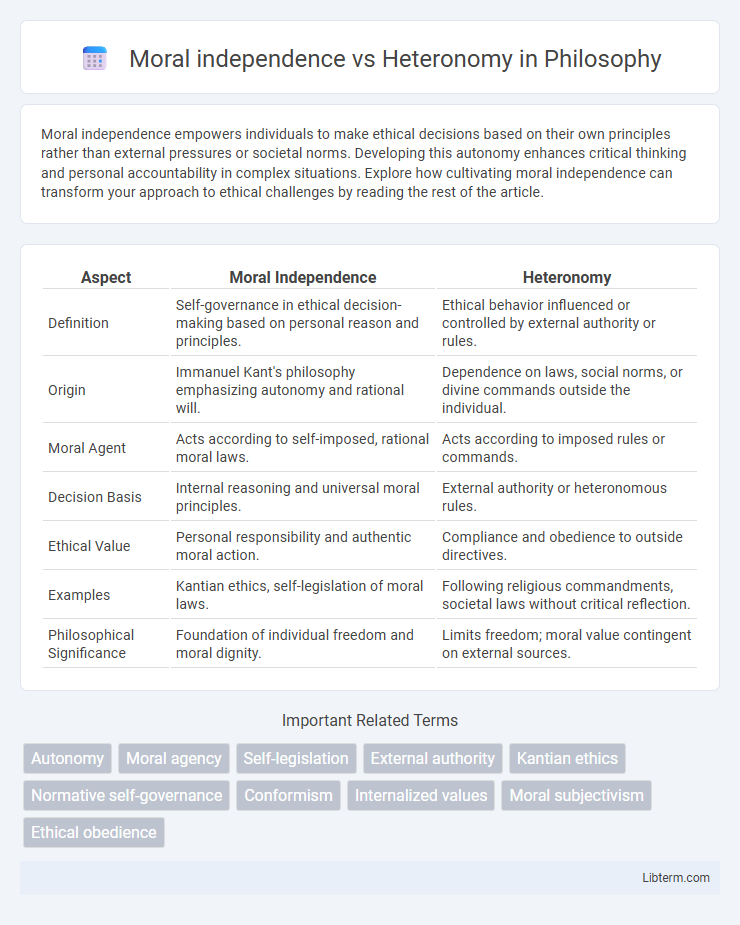Moral independence empowers individuals to make ethical decisions based on their own principles rather than external pressures or societal norms. Developing this autonomy enhances critical thinking and personal accountability in complex situations. Explore how cultivating moral independence can transform your approach to ethical challenges by reading the rest of the article.
Table of Comparison
| Aspect | Moral Independence | Heteronomy |
|---|---|---|
| Definition | Self-governance in ethical decision-making based on personal reason and principles. | Ethical behavior influenced or controlled by external authority or rules. |
| Origin | Immanuel Kant's philosophy emphasizing autonomy and rational will. | Dependence on laws, social norms, or divine commands outside the individual. |
| Moral Agent | Acts according to self-imposed, rational moral laws. | Acts according to imposed rules or commands. |
| Decision Basis | Internal reasoning and universal moral principles. | External authority or heteronomous rules. |
| Ethical Value | Personal responsibility and authentic moral action. | Compliance and obedience to outside directives. |
| Examples | Kantian ethics, self-legislation of moral laws. | Following religious commandments, societal laws without critical reflection. |
| Philosophical Significance | Foundation of individual freedom and moral dignity. | Limits freedom; moral value contingent on external sources. |
Understanding Moral Independence
Moral independence refers to the capacity to reason and make ethical decisions based on personal principles rather than external authorities or societal pressures. It involves critical reflection and autonomy in evaluating moral norms, fostering authentic commitment to values. This contrasts with heteronomy, where moral judgment is determined by external rules or commands, limiting individual ethical agency.
Defining Heteronomy in Ethics
Heteronomy in ethics refers to the condition where an individual's moral decisions are influenced or determined by external forces such as societal norms, laws, or authoritative figures, rather than by their own rational will. This concept contrasts with moral independence, which emphasizes self-governance and autonomous ethical reasoning grounded in personal conscience and critical reflection. Defining heteronomy highlights the limitation of moral agency when ethical judgments are subjugated to external pressures instead of originating from the individual's intrinsic moral framework.
Historical Perspectives on Moral Autonomy
Historical perspectives on moral autonomy reveal significant shifts from heteronomy, wherein moral principles are imposed externally by authorities or societal norms, toward the recognition of individual moral independence. Enlightenment thinkers such as Immanuel Kant emphasized autonomy as the capacity of rational agents to legislate moral laws for themselves, underscoring the importance of reason and self-governance. This transition marked a foundational development in modern ethical theory, highlighting the individual's role in determining moral values free from external control.
Key Philosophers: Kant and the Roots of Autonomy
Immanuel Kant's philosophy firmly grounds moral independence in the concept of autonomy, defining it as the capacity for rational agents to legislate moral law through reason alone, free from external influences or heteronomous pressures. Kant contrasts autonomy with heteronomy, where moral decisions are dictated by external authorities or desires rather than an internal rational will, emphasizing autonomy as crucial for genuine moral responsibility. His critical works, especially the "Groundwork of the Metaphysics of Morals," lay the foundational framework for understanding moral self-governance as essential to ethical behavior and human dignity.
Social Influences on Moral Decision-Making
Moral independence entails making ethical decisions based on personal principles, while heteronomy involves conformity to external social influences such as cultural norms, authority figures, and peer pressure. Social contexts significantly shape moral judgment, often leading individuals to align their choices with group expectations to maintain social harmony or avoid sanctions. Research in moral psychology demonstrates that awareness of social consequences and interpersonal relationships heavily impacts the balance between autonomous ethical reasoning and heteronomous conformity.
The Role of Authority in Moral Heteronomy
Moral heteronomy is characterized by an individual's actions being dictated by external authorities, such as laws, social norms, or religious doctrines, rather than by personal moral reasoning. Authority figures play a crucial role in shaping moral decisions by imposing rules and expectations that limit autonomous moral judgment. This dependence on external authority contrasts with moral independence, where individuals critically evaluate principles and make ethical choices based on internalized values.
Personal Values vs External Norms
Moral independence emphasizes the alignment of actions with personal values, fostering authentic ethical decision-making grounded in individual conscience. Heteronomy, by contrast, relies on adherence to external norms and authority, often leading to compliance without critical evaluation of those norms. Balancing personal values with societal rules is essential for achieving moral maturity and genuine autonomy.
Consequences of Moral Independence in Society
Moral independence fosters critical thinking and personal responsibility, encouraging individuals to evaluate ethical dilemmas based on internal principles rather than external authority, which can lead to diverse viewpoints and innovation in societal norms. This autonomy supports democratic values by promoting active participation and accountability within communities, enhancing social cohesion and justice. However, excessive moral independence may result in relativism, potentially undermining shared values and social consensus crucial for stability and collective welfare.
Ethical Development: From Dependence to Autonomy
Moral independence signifies an individual's ability to make ethical decisions based on personal reasoning and principles rather than relying on external authorities, reflecting advanced stages of ethical development. Heteronomy, in contrast, involves adherence to rules and moral codes imposed by outside sources, indicating a dependent stage in ethical growth. The transition from heteronomy to moral independence marks a critical evolution in moral reasoning, emphasizing autonomy and self-governance in ethical decision-making.
Navigating Modern Ethical Dilemmas
Moral independence requires individuals to base ethical decisions on personal reasoning and autonomous judgment rather than external authorities or societal norms, fostering critical thinking in complex modern dilemmas. Heteronomy, by contrast, relies on adherence to external rules or imposed values, which can limit adaptability and personal accountability in rapidly evolving ethical landscapes. Navigating contemporary issues such as digital privacy, AI ethics, and bioethical choices demands cultivating moral independence to balance societal norms with individual conscience and nuanced discernment.
Moral independence Infographic

 libterm.com
libterm.com